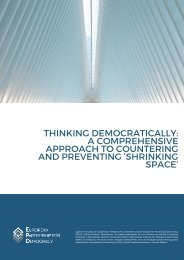Repression and resilience: Diagnosing closing space mid-pandemic
Create successful ePaper yourself
Turn your PDF publications into a flip-book with our unique Google optimized e-Paper software.
REPRESSION AND RESILIENCE: DIAGNOSING CLOSING SPACE MID-PANDEMIC<br />
5<br />
Throughout the p<strong>and</strong>emic, civil society, media <strong>and</strong> some judiciaries have been critical guardians of democratic <strong>space</strong><br />
- despite the health <strong>and</strong> socio-economic challenges experienced by many. Civil society organisations adapted quickly,<br />
<strong>and</strong> shifted their focus to providing essential services <strong>and</strong> information for at-risk populations when authorities were<br />
not able to deliver on basic needs. While this limited civil society’s ability to also hold the executive to account, media<br />
actors played a critical accountability <strong>and</strong> public information role despite facing heightened health risks <strong>and</strong> targeted<br />
attacks. In some countries the judiciary managed to uphold constitutionalism in the face of p<strong>and</strong>emic challenges, yet in<br />
other states with a politicised or partial judiciary, judicial institutions have struggled or failed to provide such oversight.<br />
The COVID crisis also weakened the oversight of opposition parties, whose scrutiny of increased executive powers <strong>and</strong><br />
lockdown conditions was often ineffective <strong>and</strong> fragmented.<br />
Recommendations for building back better<br />
The multiple impacts of the p<strong>and</strong>emic on trends <strong>and</strong> actors within the global democratic <strong>space</strong> could result in a variety<br />
of scenarios in the medium term. One possible scenario is a return to the way things were before, reinstating <strong>and</strong><br />
reinforcing a problematic status quo which has proven disadvantageous to the most vulnerable. Another possibility<br />
is that the p<strong>and</strong>emic could trigger a new era of autocratisation, in which restrictions on fundamental freedoms<br />
become a staple for authorities to preserve their power, deter democratic oversight <strong>and</strong> reduce participation a<strong>mid</strong> a<br />
sharp increase in inequality. Another scenario is to build back better, using the lessons learned from the p<strong>and</strong>emic to<br />
drastically reform decision-making, making it more inclusive, equitable, transparent <strong>and</strong> accountable. Each country<br />
will be different <strong>and</strong> it will require active global, national <strong>and</strong> local efforts to ensure that democratic <strong>space</strong> exp<strong>and</strong>s in<br />
the future.<br />
If the EU <strong>and</strong> EU Member States truly want to strengthen democratic <strong>space</strong> in the future, p<strong>and</strong>emic recovery plans<br />
need to go beyond aiming for a return of the status quo to thinking about building back better- a concept specific to<br />
each country <strong>and</strong> context. To this end, we make 8 main recommendations:<br />
1. Adopt a clear framework for identifying <strong>and</strong> analysing democratic <strong>space</strong>, which brings together existing indices<br />
as an objective metric <strong>and</strong> alert system to measure <strong>closing</strong> <strong>space</strong>.<br />
2. Strengthen global <strong>and</strong> European cooperation <strong>and</strong> coordination on democratic <strong>space</strong> with like-minded partners,<br />
to ensure coherence <strong>and</strong> effectiveness of action.<br />
3. Adapt funding modalities <strong>and</strong> practices to ensure funding empowers change-makers, from core funding for civil<br />
society to existing tools such as budget support contracts <strong>and</strong> bilateral agreements.<br />
4. Support structural reform through local civil society to ensure an inclusive post-p<strong>and</strong>emic recovery that also<br />
defends <strong>and</strong> exp<strong>and</strong>s democratic <strong>space</strong>.<br />
5. Embed accountability <strong>and</strong> transparency in support to democratic institutions <strong>and</strong> watchdogs, so as to empower<br />
them in effectively countering attacks on democratic <strong>space</strong> <strong>and</strong> providing oversight.<br />
6. Support targeted action on inclusiveness in post-p<strong>and</strong>emic recovery to protect democratic <strong>space</strong> <strong>and</strong> make it<br />
representative of all voices in society.

















